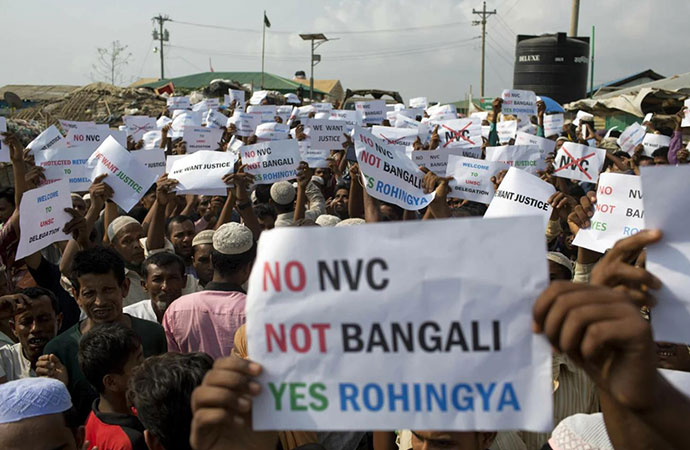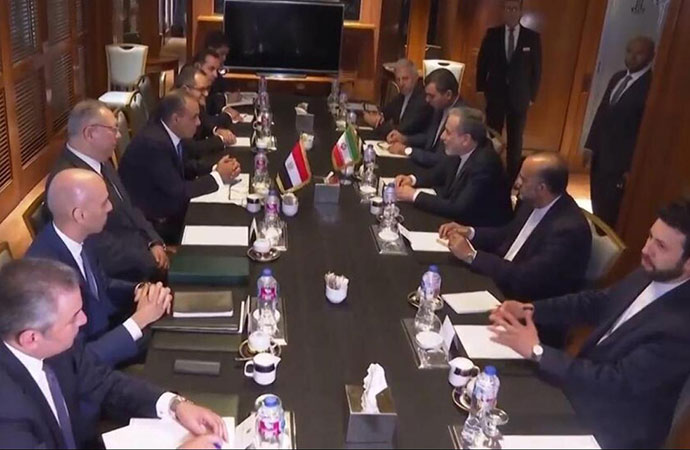Society

Photo: AP/UNB
In a recent statement, General Iqbal Karim Bhuiyan (Retd.), former Chief of Army Staff of the Bangladesh Army, rightly described the Rohingya crisis as not merely a humanitarian challenge but a direct threat to Bangladesh's sovereignty. I echo this concern without hesitation. This crisis, ignored for too long as a temporary burden, is now a national security emergency-one that, if left unresolved, could undermine Bangladesh's geopolitical standing and internal cohesion for decades.
Bangladesh has shown remarkable compassion in hosting over one million Rohingya refugees since 2017. Yet compassion without strategy is not sustainable. The time for symbolic gestures and rhetorical appeals has passed. What we now require is a coherent national doctrine-built on realism, strategic diplomacy, and long-term vision.
1. Define and Defend the Humanitarian Channel
The term "humanitarian channel" must be publicly and diplomatically defined to avoid misinterpretation. It is a civilian-focused passage for aid and protection, not a veiled corridor for foreign interests or military intervention. This clarity is essential not only for our international partners but for our own people.
Strategic communication-through formal white papers, media briefings, and diplomatic channels-must assert that Bangladesh's territorial sovereignty is non-negotiable, even as it seeks a humane resolution.
2. Initiate a Proactive Diplomatic Offensive
Bangladesh's diplomacy must now move beyond soft appeals to active leverage. A three-pronged diplomatic strategy is imperative:
a. Pressure on Myanmar
The ruling junta must face intensified pressure-from ASEAN, the UN, and regional powers-for the safe, voluntary, and dignified repatriation of the Rohingya. Simultaneously, Bangladesh must engage with non-state actors like the Arakan Army to understand their influence in the Rakhine region and assess potential collaboration or conflict dynamics.
b. Calibrated Engagement with India and China
India and China remain Myanmar's primary strategic partners. Bangladesh must engage both assertively to ensure their regional projects-such as the Kaladan and BCIM corridors-do not infringe upon our sovereignty or incentivize permanent settlement of Rohingya in Bangladesh. The so-called "corridor question" must be handled with diplomatic finesse but national firmness.
c. Global Mobilization
The international community must be reminded that this is not Bangladesh's burden alone. The crisis represents a regional security threat, with implications for trafficking, radicalization, and transnational crime. A reinvigorated campaign at the UN, OIC, and G20 forums must be launched to demand global burden-sharing and increased humanitarian aid.
3. Secure Our Borders and Internal Stability
While pursuing repatriation, we must fortify our borders and prevent further influx. Bangladesh's eastern frontier must be monitored and reinforced to block "push-in" attempts. Internally, law and order in Rohingya camps must be tightened to curb organized crime and prevent the rise of extremist ideologies. National security agencies, in coordination with international partners, should develop a joint counter-radicalization and intelligence program.
4. Develop a Concrete and Credible Repatriation Framework
The repatriation plan must go beyond policy statements and include:
• Safe Zones in Myanmar, under international monitoring.
• Restoration of Rohingya citizenship and civil rights, anchored in Myanmar's legal reform.
• Third-party verification mechanisms to ensure that returns are genuinely voluntary and sustainable.
International partners, especially those who fund development in Myanmar, must be held accountable to ensure compliance with these benchmarks.
5. Manage Internal Pressures and Protect Host Communities
The Rohingya crisis has strained local communities, especially in Cox's Bazar. Bangladesh must develop a host community development plan, supported by international funding, that includes:
• Infrastructure and livelihood programs for locals.
•Compensation mechanisms for environmental degradation.
• Public health and education initiatives that serve both refugees and citizens.
This is not only a matter of fairness but a strategic necessity to prevent social unrest and xenophobia.
6. Leverage Dr. Muhammad Yunus as Bangladesh's Special Envoy
At this critical juncture, Bangladesh must make full use of Dr. Muhammad Yunus's global stature and diplomatic reach. His established relationships with the United Nations, the United States, Japan, China, and international civil society position him uniquely to act as Bangladesh's Special Envoy on the Rohingya Crisis.
He can build bridges, open closed doors, and reframe the crisis from a Bangladesh-centric narrative to a shared global responsibility. The interim government should urgently formalize such a role and support it with a dedicated inter-ministerial task force.
Conclusion: Act Before the Clock Runs Out
Bangladesh cannot afford strategic inertia. The longer we delay, the more irreversible the damage becomes-to our borders, our economy, our national identity, and our international standing.
Let us remember: sovereignty is not merely a matter of maps-it is the ability to determine our own future. This crisis is testing that ability. We must rise not only with moral clarity but with strategic intent.
The world must hear us now-clearly, firmly, and unitedly.
Brigadier General (Retd.) Md Abdul Hamid, Former Defence Advisor, Bangladesh High Commission, India

























Leave a Comment
Recent Posts
Pedaling Through the Mangroves ...
The journey from the bustling streets of Barishal to the serene, emera ...
Why the Interim Government mus ...
Two weeks out from what is expected to be a red letter day in the figh ...
Doesn’t matter who thinks what about Bangladesh deci ..
The Other Lenin
US President Donald Trump said his administration
Govt moves to merge BIDA, BEZA, BEPZA, MIDA